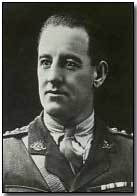Who's Who - Albert Jacka
 Albert Jacka (1893-1932) served with
the Australian Imperial Force during World War One and was its first member
to win the VC, in May 1915.
Albert Jacka (1893-1932) served with
the Australian Imperial Force during World War One and was its first member
to win the VC, in May 1915.
Born on 10 January 1983 in Victoria, the outbreak of war in August 1914 saw Jacka working in the Victorian State Forests Department at Heathcote. Enlisting twice (on 8 September and then again ten days later when his original papers were lost) his unit embarked on 22 December 1914 for two months training before being posted to Gallipoli on 26 April 1915.
Jacka quickly established a reputation as a fearsome front-line soldier. On 19 May 1915, during a concerted Turkish effort to push the Australians into the sea, ten metres of Courtney's Post trench was captured. Australian forces were situated at either end of the trench. Jacka promptly determined to clear the trench of its Turk invaders. Attacking from the rear Jacka shot five Turks with his rifle, bayoneted two more and chased the remainder out of the trench.
For this remarkable act of courage Jacka was awarded the VC - the first to be awarded to any member of the AIF. It was personally presented to Jacka by King George V at Windsor Castle on 29 September 1916.
Rapid promotion followed. He was appointed to Lance Corporal on 27 August 1915 and to Corporal the following day; to Sergeant on 12 September; Company Sergeant Major on 14 November; Second Lieutenant on 29 April 1916; to Lieutenant on 18 August and, finally, to Captain on 15 March 1917.
Matching his earlier bravery in Gallipoli Jacka received the Military Cross for his actions at Pozieres on the Somme on 7 August 1916. With the Germans over-running a portion of the Allied line which included Jacka's own dugout he reacted by single-handedly charging a significant number of the enemy who were engaged in rounding up Australian prisoners.
In the following struggle Jacka was wounded three times, once through the neck. Inspired by Jacka's actions the prisoners rebelled and forced the capture of many German prisoners in their own turn. Charles Bean, the official Australian war historian, wrote of the encounter as "the most dramatic and effective act of individual audacity in the history of the AIF".
Again, during the disastrous Australian attack upon the Hindenburg Line at Bullecourt in April 1917, Jacka - then an intelligence officer - undertook a dangerous night reconnaissance of the German wire directly in front of the planned objective. Taking two German prisoners while doing so he was subsequently awarded a bar to add to his Military Cross.
It has been speculated that Jacka would have earned several more decorations but for the belligerency of his dealings with his superior officers. Yet the men of his 14th Battalion hero-worshipped him and fashioned themselves "Jacka's Mob".
Badly gassed at the end of May 1918, and wounded when a missile passed through his trachea, Jacka saw no more fighting. Finally returning to Australia from a lengthy recuperation in England on 6 September 1919, he was discharged from the AIF on 10 January 1920, at which point he returned home to a hero's welcome in Melbourne.
A subsequent business enterprise - formed with two former members of 14th Battalion - collapsed during the depression. He married in 1929, to Veronica Carey, and was elected to the St Kilda council before becoming its mayor, where he concerned himself with the welfare of former soldiers and the unemployed.
In the wake of so many war injuries his health finally broke down in 1930. On 18 December 1931 he was admitted to hospital where he died a month later, on 17 January 1932, of nephritis. He was 39. All eight pallbearers at his funeral (held with full military honours) were fellow holders of the VC.
'White Star' was a German mixture of chlorine and phosgene gas, so-named on account of the identification marking painted on the delivery shell casing.
- Did you know?
